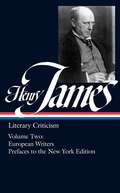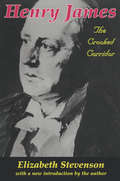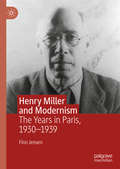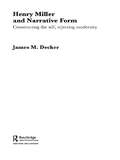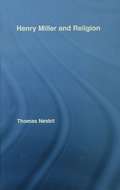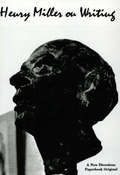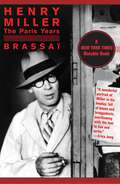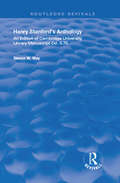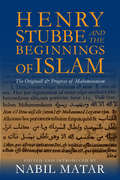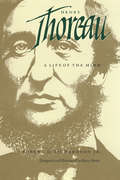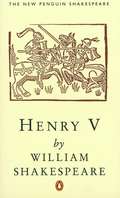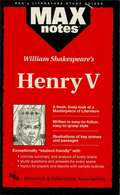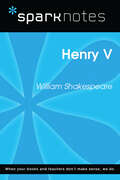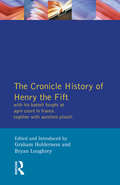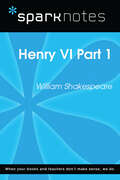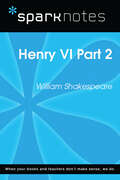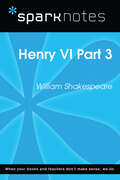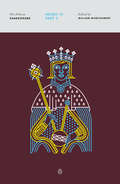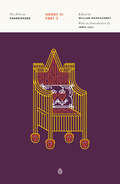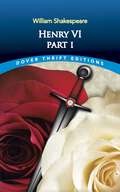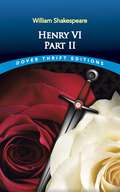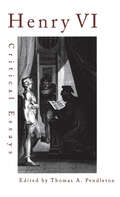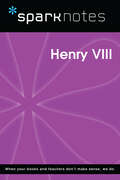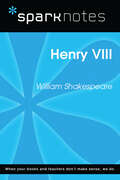- Table View
- List View
Henry James: European Writers And Prefaces To The New York Edition (Literary Classics)
by Henry JamesHenry James, renowned as one of the world’s great novelists, was also one of the most illuminating, audacious, and masterly critics of modern times. This Library of America volume is one of two volumes of the most extensive collection of his critical writings ever assembled, with many pieces never before available in book form. It includes reviews of a great number of European writers, especially French writers, along with more general essays and the Prefaces Henry James wrote for the New York Edition of his works, published between 1907 and 1909. More than one hundred reviews and essays are gathered by author, so that readers can trace the development of James’s complex, meditative, and highly volatile attitudes toward a wide spectrum of literature. James reviews the formidable Honoré de Balzac (with his “huge, all compassing, all desiring, all devouring love of reality”), Gustave Flaubert (“a pearl-diver, breathless in the thick element while he groped for the priceless word”), and Ivan Turgenev, the Russian visitor in Paris, with whom James felt great personal affinity, even though Tugenev “lacked the immense charm of absorbed inventiveness.” James delivers his critical judgments with great elegance and point, especially when he discusses the performance of other critics like Hippolyte Taine and Augustin Sainte-Beuve, and, of course, he can be wonderfully acerbic. An early moralistic essay on Baudelaire finds Poe “vastly the greater charlatan of the two, and the greater genius.” James brings his critical zest, exhilaration, and independence of judgment to bear on writers as diverse as Alphonse Daudet, George Sand, Victor Hugo, Guy de Maupassant, Théophile Gautier, J. W. von Goethe, and Gabriele D’Annunzio. Readers will find, in the complete collection of the Prefaces, one of literature’s most revealing artistic autobiographies, a wholly absorbing account of how writing gets written, and a vision of the possibilities for fiction which critics and novelists of later times will find immensely instructive and liberating. LIBRARY OF AMERICA is an independent nonprofit cultural organization founded in 1979 to preserve our nation’s literary heritage by publishing, and keeping permanently in print, America’s best and most significant writing. The Library of America series includes more than 300 volumes to date, authoritative editions that average 1,000 pages in length, feature cloth covers, sewn bindings, and ribbon markers, and are printed on premium acid-free paper that will last for centuries.
Henry James: The Crooked Corridor
by Elizabeth StevensonCertain readers and critics have faulted Henry James for two contradictory reasons. He has been thought a writer limited in scope and depth in his treatment of a particular class of people. On the other hand, he has been thought to be too complex, too extreme in putting into difficult language his view of relationships between his chosen characters.Elizabeth Stevenson depicts Henry James as a stout and strong presence in the literature of the English language. From the relatively youthful, straightforward, and simple writing of his early years, to the involved complexities of his later stories, his significance cannot be denied. The barrier seems to have been a misunderstanding on the part of some. It is true nearly all of his characters are well clothed, well fed, and roofed comfortably. They are usually fairly well educated and talk literately and wittily. James rarely treats raw or wild nature, but he is sensitive to landscape as a background. He also does children well, and they are often outside the norms of society. Who is not touched by the uncanny in the tainted children of The Turn of the Screw, whether the taint is actually in the children or in the mind of the governess?In James, one may not travel physically a great deal, except to the resorts of those well-off financially and socially. One does travel extensively through the minds and hearts of his characters. The journey rewards the traveler. The delicacy of James' "melodramatic" insights causes tremor or appreciation from a reader. He describes the way life is, both horrible and wonderful. No one else has expressed this understanding in quite his way. Henry James: The Crooked Corridor will be of interest to students of American literature and general readers interested in biographies.
Henry Miller and Modernism: The Years in Paris, 1930–1939
by Finn JensenHenry Miller and Modernism: The Years in Paris, 1930–1939 represents a major reevaluation of Henry Miller, focusing on the Paris texts from 1930 to 1939. Finn Jensen analyzes Miller in the light of European modernism, in particular considering the many impulses Miller received in Paris. Jensen draws on theories of urban modernity to connect Miller’s narratives of a male protagonist alone in a modern metropolis with his time in Paris where he experienced a self-discovery as a writer. The book highlights several sources of inspiration for Miller including Nietzsche, Rimbaud, Hamsun, Strindberg and the American Transcendentalists. Jensen considers the key movements of modernity and analyzes their importance for Miller, studying Eschatology, the Avant-Garde, Dada, Surrealism, Expressionism, and Anarchism.
Henry Miller and Narrative Form: Constructing the Self, Rejecting Modernity
by James DeckerIn this bold study James M. Decker argues against the commonly held opinion that Henry Miller’s narratives suffer from ‘formlessness’. He instead positions Miller as a stylistic pioneer, whose place must be assured in the American literary canon. From Moloch to Nexus through such widely-read texts as Tropic of Cancer and Tropic of Capricorn, Decker examines what Miller calls his ‘spiral form’, a radically digressive style that shifts wildly between realism and the fantastic. Drawing on a variety of narratological and critical sources, as well as Miller’s own aesthetic theories, he highlights that this fragmented narrative style formed part of a sustained critique of modern spiritual decay. A deliberate move rather than a compositional weakness, then, Miller’s style finds a wide variety of antecedents in the work of such figures as Nietzsche, Rabelais, Joyce, Bergson and Whitman, and is viewed by Decker as an attempt to chart the journey of the self through the modern city. Henry Miller and Narrative Form affords readers new insights into some of the most challenging writings of the twentieth century and provides a template for understanding the significance of an extraordinary and inventive narrative form.
Henry Miller and Religion (Studies in Major Literary Authors)
by Thomas NesbitThis study argues that this previously banned author devoted his entire life to articulating a religion of self-liberation in his autobiographical books, examining his life and work within the context of fringe religious movements that were linked with the avant-garde in New York City and Paris at the first of the 20th century. This study shows how these transatlantic movements – including Gurdjieff, Rosicrucianism, and Theosophy – gave him the hermeneutical devices, not to mention the creative license, to interpret texts and symbols from mainline religions in an iconoclastic manner, ranging from obscure Taoist treatises to the mystical works of Jacob Boehme. The influence of numerous philosophical sources widely circulated in his most critical years – particularly Henri Bergson’s Two Sources of Morality and Religion (1932) – also helped him develop a religious view situated between transcendence and immanence, in which self-liberation through the channeled flow of élan vital is the chief objective. Miller’s knowledge of these intellectual currents, along with his involvement with sidestream religious groups, inspired him to meld his religious and literary aims into one perplexing project.
Henry Miller on Writing
by Henry Miller"A brilliant selection . . . it is in short a voyage of discovery, an adventure and this the log of that voyage in the life of a probing and powerful writer." --Robert R. Kirsch, Los Angeles Times. Some of the most rewarding pages in Henry Miller's books concern his self-education as a writer. He tells, as few great writers ever have, how he set his goals, how he discovered the excitement of using words, how the books he read influenced him, and how he learned to draw on his own experience.
Henry Miller: The Paris Years
by Brassaï&“A wonderful portrait of Miller in his heyday: full of beans and braggadocio, overflowing with the lust to live and write.&”—Erica Jong His years in Paris were the making of Henry Miller. He arrived with no money, no fixed address, and no prospects. He left as the renowned if not notorious author of Tropic of Cancer and Tropic of Capricorn. Miller didn&’t just live in Paris—he devoured it. It was a world he shared with Brassaï, whose work, first collected in Paris by Night, established him as one of the greatest photographers of the twentieth century and the most exquisite and perceptive chronicler of Parisian vice. In Miller, Brassaï found his most compelling subject. Henry Miller: The Paris Years is an intimate account of a writer&’s self-discovery, seen through the unblinking eye of a master photographer. Brassaï delves into Miller&’s relationships with Anaïs Nin and Lawrence Durrell, as well as his hopelessly tangled though wildly inspiring marriage to June. He uncovers a side of the man scarcely known to the public, and through this careful portrait recreates a bright and swift-moving era. Most of all, Brassaï evokes their shared passion for the street life of the City of Light, captured in a dazzling moment of illumination.
Henry Stanford's Anthology: An Edition of Cambridge University Library manuscript Dd. 5.75 (Routledge Revivals)
by Henry StanfordPublished in 1988: This book is a compilation of 16th century poetry and manuscripts.
Henry Stubbe and the Beginnings of Islam
by Nabil MatarHenry Stubbe (1632--1676) was a revolutionary English scholar who understood Islam as a monotheistic revelation in continuity with Judaism and Christianity. His major work, An Account of the Rise and Progress of Mahometanism, was the first English text to positively document the Prophet Muhammad's life, celebrate the Qur'an as a divine revelation, and praise the Muslim toleration of Christians, undermining a long legacy of European prejudice and hostility.Nabil Matar, a leading scholar of Islamic-Western relations, standardizes Stubbe's text and situates it within England's theological climate. He shows how, to draw a positive portrait of Muhammad, Stubbe embraced travelogues, early church histories, Arabic chronicles, Latin commentaries, and studies on Jewish customs and scriptures, produced in the language of Islam and in the midstof the Islamic polity.
Henry Stubbe and the Beginnings of Islam: The Originall & Progress of Mahometanism (Records Of Western Civilization Ser.)
by Ed. Matar NabilHenry Stubbe (1632–1676) was an extraordinary English scholar who challenged his contemporaries by writing about Islam as a monotheistic revelation in continuity with Judaism and Christianity. His major work, The Originall & Progress of Mahometanism, was the first English text to document the Prophet Muhammad's life positively, celebrate the Qur'an as a divine revelation, and praise the Muslim toleration of Christians, undermining a long legacy of European prejudice and hostility.Nabil Matar, a leading scholar of Islamic-British relations, standardizes Stubbe's text and situates it within England's theological and intellectual climate in the seventeenth century. He shows how, to draw a historical portrait of Muhammad, Stubbe embraced travelogues, Latin commentaries, studies on Jewish customs and Scripture, and, most important, Arabic chronicles, many written by medieval Christian Arabs who had lived in the midst of the Islamic polity. No European writer before or for a long time after Stubbe produced anything similar to what he wrote about Muhammad the "great Prophet," Ali the "gallant" advocate, and the "standing miracle" of the Qur'an. Stubbe's book therefore makes a unique contribution to the study of the representation of Islam in Western thought.
Henry Thoreau: A Life of the Mind
by Barry Moser Robert D. Richardson Jr.This biography of Henry Thoreau offers insight into his social activism, his interest in fine arts, William Gilpin and John Ruskin's influence on his nature writing, and his involvement in, and influence by, the Agassiz-Darwin debate over The Origin of Species. .
Henry V
by William Shakespeare A. HumphreysShakespeare's immutable history of Henry's victory over the French at Agincourt and the subsequent peace between the two nations is also a study of war and kingship. From a wild youth, Henry comes to embody all of the kingly virtues: courage, justice, integrity and honour. Ironically these qualities are brought to the fore by the realities of war. Written at the end of the life of Elizabeth I, Henry V told the British people that with strong leadership, they had little to fear at a time of uncertainty.
Henry V (MAXNotes Literature Guides)
by Nick PeaseREA's MAXnotes for William Shakespeare's Henry V The MAXnotes offers a comprehensive summary and analysis of Henry V and a biography of William Shakespeare. Places the events of the play in historical context and discusses each act in detail. Includes study questions and answers along with topics for papers and sample outlines.
Henry V (SparkNotes Literature Guide Series)
by SparkNotesHenry V (SparkNotes Literature Guide) by William Shakespeare Making the reading experience fun! Created by Harvard students for students everywhere, SparkNotes is a new breed of study guide: smarter, better, faster.Geared to what today's students need to know, SparkNotes provides:chapter-by-chapter analysis explanations of key themes, motifs, and symbols a review quiz and essay topics Lively and accessible, these guides are perfect for late-night studying and writing papers.
Henry V - The Quarto (Sos)
by William Shakespeare Graham Holderness Bryan LoughreyOne of a series on Shakespeare's original texts, including facsimile pages, this version of "Henry V" is claimed to be, in some ways, the most authentic version of the play that we have. Included are an introduction, notes, and a theoretical, historical and contextual critique. The original text - or First Quarto - of "Henry V", published in 1600, is missing the Chorus, a dramatic device which recent criticism has used to suggest a strikingly modern view of history and politics. These and other significant changes mean that critics can no longer assume that the play presents a distanced, ironic perspective on its own political and military action. If Elizabethan audiences saw in performance something closer to the First Folio than the 1623 Folio text, then their dramatic engagement with history was of a kind very different from that of the play's 20th-century interpreters. This new edition makes available the original text of "Henry V", in all its theatrical simplicity and historical difference.
Henry VI Part 1 (SparkNotes Literature Guide Series)
by SparkNotesHenry VI Part 1 (SparkNotes Literature Guide) by William Shakespeare Making the reading experience fun! Created by Harvard students for students everywhere, SparkNotes is a new breed of study guide: smarter, better, faster.Geared to what today's students need to know, SparkNotes provides:*chapter-by-chapter analysis *explanations of key themes, motifs, and symbols *a review quiz and essay topics Lively and accessible, these guides are perfect for late-night studying and writing papers.
Henry VI Part 2 (SparkNotes Literature Guide Series)
by SparkNotesHenry VI Part 2 (SparkNotes Literature Guide) by William Shakespeare Making the reading experience fun! Created by Harvard students for students everywhere, SparkNotes is a new breed of study guide: smarter, better, faster.Geared to what today's students need to know, SparkNotes provides:chapter-by-chapter analysis explanations of key themes, motifs, and symbols a review quiz and essay topics Lively and accessible, these guides are perfect for late-night studying and writing papers.
Henry VI Part 3 (SparkNotes Literature Guide Series)
by SparkNotesHenry VI Part 3 (SparkNotes Literature Guide) by William Shakespeare Making the reading experience fun! Created by Harvard students for students everywhere, SparkNotes is a new breed of study guide: smarter, better, faster.Geared to what today's students need to know, SparkNotes provides:chapter-by-chapter analysis explanations of key themes, motifs, and symbols a review quiz and essay topics Lively and accessible, these guides are perfect for late-night studying and writing papers.
Henry VI, Part 2 (The Pelican Shakespeare)
by William ShakespeareThe acclaimed Pelican Shakespeare series edited by A. R. Braunmuller and Stephen Orgel The legendary Pelican Shakespeare series features authoritative and meticulously researched texts paired with scholarship by renowned Shakespeareans. Each book includes an essay on the theatrical world of Shakespeare’s time, an introduction to the individual play, and a detailed note on the text used. Updated by general editors Stephen Orgel and A. R. Braunmuller, these easy-to-read editions incorporate over thirty years of Shakespeare scholarship undertaken since the original series, edited by Alfred Harbage, appeared between 1956 and 1967. With definitive texts and illuminating essays, the Pelican Shakespeare will remain a valued resource for students, teachers, and theater professionals for many years to come. For more than seventy years, Penguin has been the leading publisher of classic literature in the English-speaking world. With more than 1,700 titles, Penguin Classics represents a global bookshelf of the best works throughout history and across genres and disciplines. Readers trust the series to provide authoritative texts enhanced by introductions and notes by distinguished scholars and contemporary authors, as well as up-to-date translations by award-winning translators.
Henry VI, Part 3 (The Pelican Shakespeare)
by William ShakespeareThe acclaimed Pelican Shakespeare series edited by A. R. Braunmuller and Stephen Orgel The legendary Pelican Shakespeare series features authoritative and meticulously researched texts paired with scholarship by renowned Shakespeareans. Each book includes an essay on the theatrical world of Shakespeare’s time, an introduction to the individual play, and a detailed note on the text used. Updated by general editors Stephen Orgel and A. R. Braunmuller, these easy-to-read editions incorporate over thirty years of Shakespeare scholarship undertaken since the original series, edited by Alfred Harbage, appeared between 1956 and 1967. With definitive texts and illuminating essays, the Pelican Shakespeare will remain a valued resource for students, teachers, and theater professionals for many years to come. For more than seventy years, Penguin has been the leading publisher of classic literature in the English-speaking world. With more than 1,700 titles, Penguin Classics represents a global bookshelf of the best works throughout history and across genres and disciplines. Readers trust the series to provide authoritative texts enhanced by introductions and notes by distinguished scholars and contemporary authors, as well as up-to-date translations by award-winning translators.
Henry VI, Part I: Webster's Spanish Thesaurus Edition (Dover Thrift Editions)
by William ShakespeareWith the untimely death of England's great soldier-king, Henry V, the crown passes to his young and inexperienced son. While the nobles quarrel among themselves and compete for influence over the new monarch, the French seize the opportunity to reclaim their former territories from English possession. The success of the French armies rests upon an unlikely leader: the peasant girl Joan La Pucelle, known to history as Joan of Arc.The first of three plays based on the life of the England's 15th-century monarch, this historical drama chronicles the conflict between the York and Lancaster factions that led to the War of the Roses. Each part of the trilogy is self-contained and can be appreciated without knowledge of the others. Vivid characterization, dark comedy, and powerful language combine for a memorable portrait of a country devastated by civil war.
Henry VI, Part II: Webster's Chinese Simplified Thesaurus Edition (Dover Thrift Editions)
by William ShakespearePreferring a life of spiritual contemplation, Henry VI leaves politics to his nobles. The resulting power struggle pits the Houses of York and Lancaster against one another for control of the crown. Against a backdrop of violent rebellion, the play explores the relationship between law and justice and the extent of a ruler's authority.The second of three plays based on the life of England's fifteenth-century monarch, this historical drama chronicles the conflicts behind the War of the Roses. Each part of the trilogy is self-contained and can be appreciated without knowledge of the others. Vivid characterization, dark comedy, and powerful language combine for a memorable portrait of a country devastated by civil war.
Henry VI: Critical Essays (Shakespeare Criticism #Vol. 22)
by Thomas A. PendletonThis collection of original essays provides a selection of current criticism on the Henry VI plays. Topics addressed will include feminist commentaries on the play, the principal of unity in the trilogy, the tradition of illumination of the play, textual variations, and finally, anachronism and allegory.
Henry VIII (SparkNotes Biography Guide)
by SparkNotesHenry VIII (SparkNotes Biography Guide) Making the reading experience fun! Created by Harvard students for students everywhere, SparkNotes is a new breed of study guide: smarter, better, faster.Geared to what today's students need to know, SparkNotes provides:chapter-by-chapter analysis explanations of key themes, motifs, and symbols a review quiz and essay topics Lively and accessible, these guides are perfect for late-night studying and writing papers.
Henry VIII (SparkNotes Literature Guide Series)
by SparkNotesHenry VIII (SparkNotes Literature Guide) by William Shakespeare Making the reading experience fun! Created by Harvard students for students everywhere, SparkNotes is a new breed of study guide: smarter, better, faster.Geared to what today's students need to know, SparkNotes provides:chapter-by-chapter analysis explanations of key themes, motifs, and symbols a review quiz and essay topics Lively and accessible, these guides are perfect for late-night studying and writing papers.
